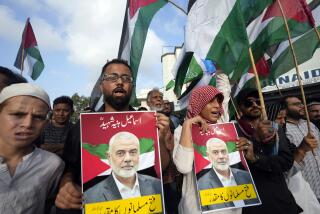NEWS ANALYSIS : Confrontation Wrecks U.S. Effort for Israel-PLO Talks : Peace process: Arafat’s support of the invasion adds strain to the tenuous relationship with Washington.
- Share via
WASHINGTON — The burgeoning Persian Gulf confrontation has administered the coup de grace to the Bush Administration’s already badly damaged effort to bring about peace talks between Israel and its Palestinian adversaries.
No matter how the current crisis plays itself out, U.S. Middle East diplomacy will be changed radically and probably irrevocably. Paradoxically, both Israel and the Palestine Liberation Organization may emerge as net losers.
“The peace process was dead in the water anyway,” said Samuel L. Lewis, former U.S. ambassador to Israel. “These events really have put a strong period after the whole (U.S.) effort that has been going on over the last year.”
The PLO and its chairman, Yasser Arafat, may have written themselves permanently out of the diplomatic script by supporting Iraq’s invasion of Kuwait. The PLO was one of only two members of the Arab League that voted against a resolution last weekend condemning Iraqi aggression.
The sight of Arafat embracing Iraqi President Saddam Hussein must have gladdened hearts all over Israel because it makes it far more difficult for the United States to resume its dialogue with the PLO. The talks were broken off last month after the organization refused to condemn an abortive attack on a crowded Tel Aviv beach by a PLO splinter group.
But the crisis also will strengthen the bonds between the United States and the Arab countries standing with it against Iraq. Washington has long maintained cordial relations with Egypt, Saudi Arabia and Morocco, three moderate Arab states that have lined up with Washington.
In addition, Syria has announced that it will join the anti-Iraq cause, possibly improving its long-strained relationship with the United States. Many Middle East experts believe that the Administration will come under increasing pressure to provide some subtle rewards to its Arab allies by showing more sympathy for the Palestinian position.
Most regional experts said that full-scale war is not likely, although it is difficult to predict the precise course of the crisis. But they said that the impact on the U.S. approach to the Arab-Israel peace process will be much the same, no matter what happens, provided there is no war.
“Looked at from the Israeli perspective, the crisis helps Israel in terms of its security but poses some problems on the diplomatic front,” said Geoffrey Kemp, a National Security Council expert on the Middle East during the Reagan Administration.
“No matter what happens, it will be much more difficult for Iraq to get the high technology it needs to produce nuclear weapons and advanced missiles,” said Kemp, now a senior associate of the Carnegie Endowment for International Peace. “Even if there is an early and peaceful resolution, there will be a tightening of the screws” on military and technological assistance to Iraq.
Also, Kemp said, Israel’s argument that Arab armies are more dangerous than Palestinian rock-throwers will take on added credibility.
However, he said that once the gulf confrontation ends, there will be an added urgency to “get on top of the peace process,” something that might require Israel to take steps that it has long been reluctant to take, such as face-to-face meetings with Palestinian representatives.
William B. Quandt, the National Security Council’s Middle East specialist in the Carter Administration, said that after the crisis, the Arab regimes that supported the United States will expect some rewards.
“We will have to do something that gains a bit of credibility with the Arab man on the street and gives the pro-Western regimes room to maneuver,” Quandt said. “When the dust settles on this, the Palestinian-Israeli issue will still be there unresolved.
“So far, Bush has incurred no debt whatsoever to Israel,” Quandt said. “He has not talked to (Israeli Prime Minister Yitzhak) Shamir, and there has been no talk of the strategic relationship. Israel seems irrelevant to this crisis. On the other hand, Bush will be somewhat indebted to some of the Arabs.”
At the same time, the crisis has put additional strains on the already bankrupt relationship between the United States and the PLO. Arafat’s support for Hussein would seem to preclude any resumption of the U.S.-PLO dialogue.
However, some Administration officials are remarkably tolerant of Arafat’s position, describing him as a “weather vane” who embraced the Iraqi leader because he seemed to be winning and who can be expected to shift his support to Egypt or Saudi Arabia if the allied position seems to be prevailing.
One senior official said that Washington’s conditions for resuming the dialogue with the PLO are unchanged as a result of the crisis. By condemning the Tel Aviv raid, the PLO could restore its tattered relationship with the United States.
More to Read
Sign up for Essential California
The most important California stories and recommendations in your inbox every morning.
You may occasionally receive promotional content from the Los Angeles Times.













